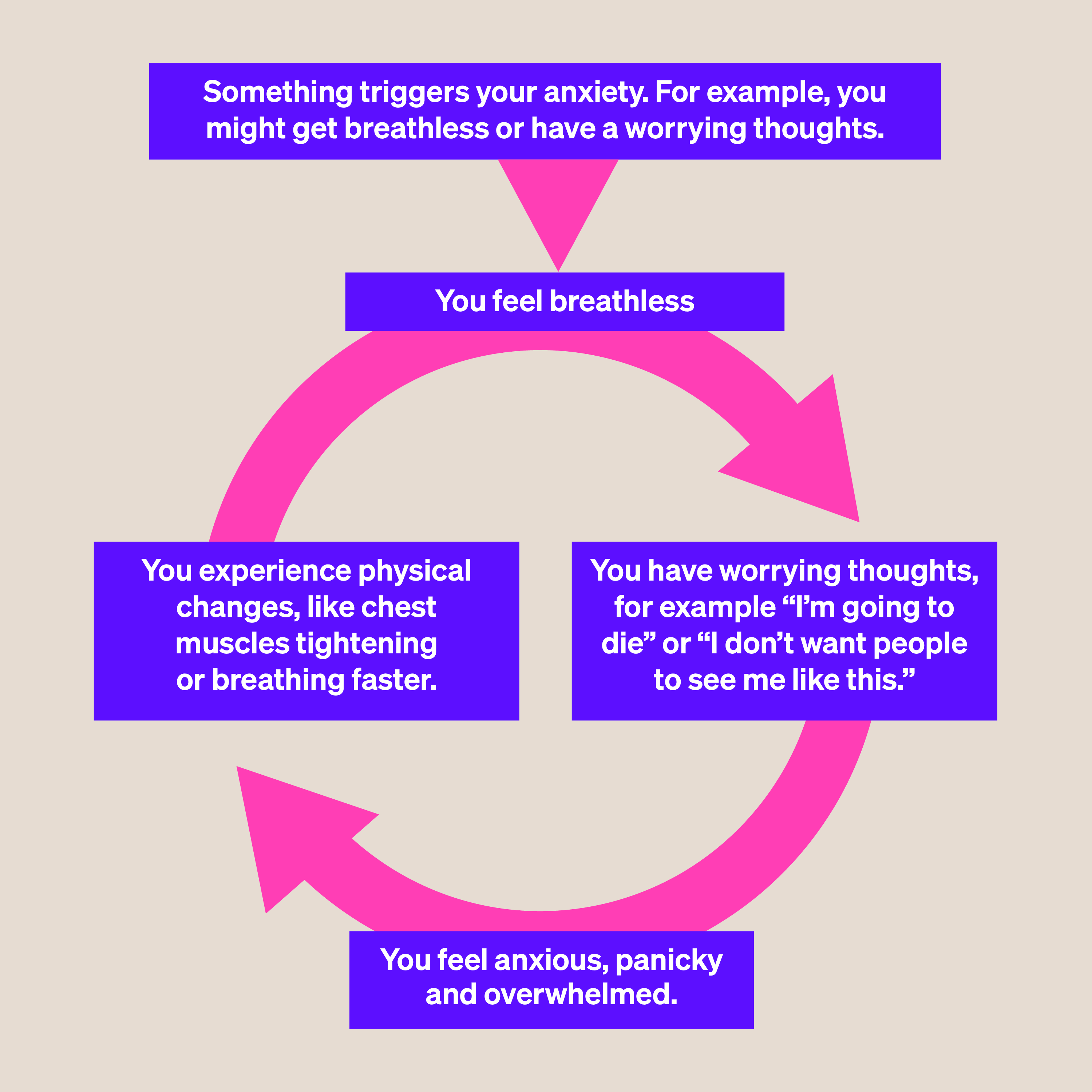What is anxiety?
Anxiety is a feeling of fear, worry, or unease that goes on for some time, and can get in the way of you enjoying life.
Studies suggest that anxiety is common when people have a long-term condition, including a long-term lung condition. A lot of things can cause anxiety, and anxiety affects people in different ways.
Some people may experience panic attacks, social phobia, or post-traumatic stress disorder (PTSD), particularly following a traumatic hospital admission.
Sometimes there may be no clear reason why you feel anxious.
Anxiety can have a lot of different symptoms, both physical and emotional.
The NHS has more information about anxiety, fear and panic and a full list of the signs and symptoms of anxiety.
If you haven’t had anxiety before it can feel scary. But there’s a lot of organisations offering help and support.
Anxiety and your lung condition
Feeling anxious could make your lung symptoms feel worse, because anxiety can change the way you breathe and cause symptoms.
When you’re anxious, you might feel more emotional or have panic attacks. Being extremely anxious could cause flare-ups of your lung condition or asthma attacks.
Anxiety is also linked to stress, and when you’re stressed:
- you might not take your medicines as prescribed
- if you have asthma, you’re more likely to react to your usual asthma triggers.
- you may smoke more, which can put you at more risk of lung symptoms.
Anxiety can affect our body, thoughts, and feelings in different ways.
Feeling breathless may make you feel more anxious, which in turn may make your breathlessness worse, starting up a cycle that can feel hard to get out of:

Is it anxiety or breathlessness?
It can be easy to confuse anxiety symptoms with lung symptoms like breathlessness.
Talk to your GP or nurse about your symptoms as soon as you can. They can support you with any stress or anxiety you’re experiencing. At the same time, they can talk about ways to manage your breathlessness.
Always carry your reliever inhaler (rescue inhaler) with you. This means you can use it straight away if you get symptoms.
Panic attacks
A panic attack is a sudden and extreme attack of anxiety. Panic attacks are when your feelings of anxiety get worse suddenly.
In a panic attack you can get a lot of physical symptoms very quickly. For example, your heart might beat more quickly, or you may feel sweaty, sick, or shaky. You might feel you are short of breath.
The charity Mind have more information about panic attacks, including advice on what to do during a panic attack.
Asthma and anxiety attacks have some of the same symptoms. It’s helpful to know the differences between the two.
You might experience some, or all of, the following symptoms:
| Asthma attack symptoms | Panic attack symptoms | Symptoms common to both |
| Coughing | Shortness of breath | Breathlessness |
| Wheezing | Tingling in fingers/lips | Tight chest/chest pain |
| Your reliever inhaler isn’t helping, or you need to use it more than every four hours | Feeling sick (nausea) | Feeling faint |
| Your peak flow score is lower than normal | Numbness or pins and needles | A faster and more noticeable heartbeat |
| Blue lips or fingers (if you have dark skin you might see this might be easier to see on your lips, tongue and gums, under your nails, or around your eyes) | Sweating/hot flushes | Dizziness |
| Shaking/trembling |
Self-care for anxiety
There are a lot of things that can help you to manage your anxiety symptoms, such as:
- getting active
- doing breathing exercises
- connecting with others who have had similar experiences of anxiety on our HealthUnlocked forum
- self-help therapies that you can try on your own to help with problems like stress and anxiety. Have a look at the NHS website for more information.
It’s a good idea to try different things because what works for other people might not work for you, and the other way round.
Treatments for anxiety
Talk to your GP, nurse or healthcare team about how you’re feeling. They can offer you support and help you to manage your mental health.
They may suggest:
- talking treatments, counselling, or therapy – cognitive behavioural therapy (CBT) is often used to treat anxiety
- antidepressants or other medication, you can discuss which type is right for you with your doctor – but they should offer you talking therapy alongside medication too
- pulmonary rehabilitation (PR) – research has shown PR improves not only your fitness, but your mental well-being.
The charity Mind has more advice about how to seek help for a mental health problem.
The NHS has more detailed information on treatment for generalised anxiety disorder in adults.

Get support
Call our Helpline for support with your condition. Get advice on your medicines, symptoms or travelling with a lung condition, or just call us to say hello.




